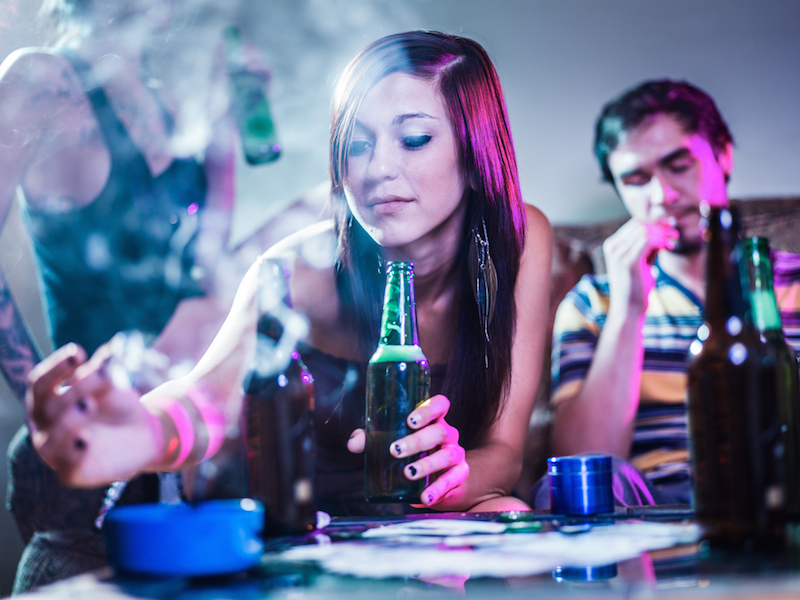Do Pot Smokers Drink More or Less? Results Are Mixed

Do people who use legal marijuana drink less or more alcohol? The answer, it turns out, is complicated, a new study finds.
It seems logical that people who are already high on marijuana would have less of a desire to drink alcohol than people who weren't high, and so the pot smokers should drink less (which researchers sometimes refer to as “replacement,” meaning one drug is replaced with another.) However, it's also possible that people who use one substance are more likely to use another, and so pot smokers might drink more. Researchers have been trying to find out which is true.
"The evidence is definitely mixed," said the lead author of the new study, Katarína Guttmannová, a research scientist in the Social Development Research Group at the University of Washington in Seattle. "In the context of marijuana policy changes," pot sometimes replaces alcohol use, but in other cases pot increases drinking, she said. [11 Odd Facts About Marijuana]
The question about the relationship between the two substances is important, she said. As more states make medical and recreational marijuana legal, researchers are wondering what kinds of societal effects the new laws will have. On one hand, fewer people will be jailed for using cannabis, and costs to the criminal justice system will likely drop, Guttmannová said.
"On the other hand, legalization could also bring some big costs if it turns out that it leads to increases in marijuana and/or other substance use," Guttmannová told Live Science in an email.
To investigate how the increasingly popular drug affects people's alcohol use, Guttmannová and her colleagues looked at 15 peer-reviewed studies that addressed the decriminalization of marijuana, or the legalization of either medical marijuana or recreational marijuana, and the impact of these actions on alcohol use.
Alcohol is the most widely used drug in the United States, the researchers said. "We chose to focus on alcohol because even relatively small changes in alcohol consumption could have profound implications for public health, safety and related costs," Guttmannová said in a statement.
Get the world’s most fascinating discoveries delivered straight to your inbox.
In the study, the researchers tried to determine whether legalized marijuana was becoming a substitute for alcohol — that is, whether people were drinking less alcohol and using pot instead. If this is the case, marijuana's legalization would likely lower the costs to society that are related to excessive drinking, because of reduced health care costs, fewer traffic accidents and improved workplace productivity, the researchers said.
However, it is also possible that legalizing weed (marijuana is recreationally legal in four states and the District of Columbia, and medically legal in 23 states) leads to increased pot and alcohol use. In this scenario, researchers would expect to see other problems. For instance, people who use marijuana and alcohol at the same time are twice as likely to drive drunk and face social troubles, including relationship problems and drunken fights, researchers have found.
Unexpected results
After analyzing the data, the researchers found that there was no clear answer. Instead, the relationship between alcohol and marijuana use varied depending on demographics and how often and what type of substances people were using.
For instance, one study found that in cities where marijuana was decriminalized, there were more emergency room visits related to pot, but fewer visits linked to alcohol and other drugs after the decriminalization compared with before it. Other studies showed that high school seniors in states where pot was decriminalized tended to drink less alcohol than those in states with stricter marijuana policies.. However, other studies found that college students who used pot also drank more than those who did not use pot, the researchers said.
Findings were also mixed on medical marijuana use. Two of the studies found that private medical marijuana businesses (dispensaries) were linked to increased alcohol use, and one did not.
Interestingly, states that had legalized medical marijuana had fewer alcohol-related deaths, but states that had not only legalized the drug but also made it legal for dispensaries to sell the drug saw the opposite effect. [7 Ways Alcohol Affects Your Health]
The alcohol-marijuana relationship also depends on age. Legalized medical marijuana isn't associated with increases in underage drinking, but it is linked with increased binge drinking and simultaneous pot and alcohol use among adults, the researchers said.
"This is an important question, and there are no easy answers," Guttmannová told Live Science. "But that's OK. This is the science of human behavior in the context of many forces — economic, legal and social … so the answer is bound to be complicated."
More research is needed, especially as states continue to change and implement laws regarding medical and recreational marijuana use, Guttmannová said. In particular, researchers should try to study substance use in different age groups, and consider whether people are regular consumers of the substances, or if they use them only periodically, she said.
Whatever the final findings are, they will likely be nuanced, Guttmannová said.
"The answer will likely be longer than something that could be tweeted or summarized in a neat punch line, because it will need to include caveats, such as what kind of use, for whom, when, and where or under what conditions the answer applies," Guttmannová said.
The study was published online Dec. 21 in the journal Alcoholism: Clinical and Experimental Research.
Follow Laura Geggel on Twitter @LauraGeggel. Follow Live Science @livescience, Facebook & Google+. Original article on Live Science.

Laura is the managing editor at Live Science. She also runs the archaeology section and the Life's Little Mysteries series. Her work has appeared in The New York Times, Scholastic, Popular Science and Spectrum, a site on autism research. She has won multiple awards from the Society of Professional Journalists and the Washington Newspaper Publishers Association for her reporting at a weekly newspaper near Seattle. Laura holds a bachelor's degree in English literature and psychology from Washington University in St. Louis and a master's degree in science writing from NYU.
 Live Science Plus
Live Science Plus





